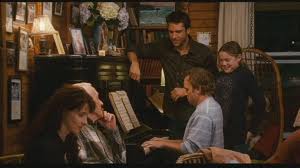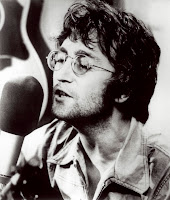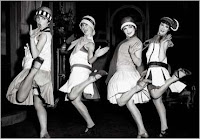Meanwhile, parents and grandparents applaud enthusiastically from the audience thinking, "Isn't it wonderful to know that we're instilling our children with a love for music?"
As a music teacher I have been confronted with this irony many times, and have ultimately begun to ask myself whether recitals accomplish what we want them to. The case for them is simple: 1) They motivate students to practice, 2) Parents get to see the results of their financial investment, and 3) The point of music is for people to hear and enjoy it! Having a concert give students a chance to share their music with an appreciative audience. The first two reasons are purely pragmatic. To me, the third reason is philosophically the most important. If we want students to love music making, we should provide them with positive experiences that set them up for success and ultimately bring them joy.
The trouble is, recitals don't do that. If you were to take a survey of everyone who has ever performed in a piano or violin recital and asked them whether they enjoyed the experience, I would bet every dollar in my bank account that at least 70% of them would say no. Even after a great performance, most students express relief and are not eager to do it again. And not all performances are great. Many people have horror stories of recitals that went poorly and left them feeling frustrated and embarrassed. A small minority of people probably do enjoy themselves. They are fortunate and few.
A current trend in public school music programs is the Solo and Ensemble Contest (a locally organized, smaller version of the state-wide competitions.) This event invites students to play a piece for a judge and be evaluated on the quality of their performance. In a perfect world, it gives students a chance to perform a piece of music, receive constructive feedback and compete for honors. In reality, it's a mixed bag. Some judges are sensitive enough to balance their criticism with encouragement, while others issue harsh critiques that leave students devastated. These types of performing can leave students with the feeling that the point of being in music is to be good at it. If you don't mess up, it's a success!
Luckily, many students have music programs at school where they can be in a music group they enjoy - high school brings back memories of pep band, the concert choir, and chamber orchestra, and these were wonderful. But if you're a studio piano teacher, or you work with home school families, these opportunities are not readily available. A recital is the logical choice.
 Still, I want to experiment with other things. This year I would like to try a few low-pressure ideas that students might enjoy more. Here are a few recommendations from friends and colleages:
Still, I want to experiment with other things. This year I would like to try a few low-pressure ideas that students might enjoy more. Here are a few recommendations from friends and colleages:
Luckily, many students have music programs at school where they can be in a music group they enjoy - high school brings back memories of pep band, the concert choir, and chamber orchestra, and these were wonderful. But if you're a studio piano teacher, or you work with home school families, these opportunities are not readily available. A recital is the logical choice.
 Still, I want to experiment with other things. This year I would like to try a few low-pressure ideas that students might enjoy more. Here are a few recommendations from friends and colleages:
Still, I want to experiment with other things. This year I would like to try a few low-pressure ideas that students might enjoy more. Here are a few recommendations from friends and colleages:- Jam Sessions: I have students who enjoy fiddle music, so getting a few people together with bass, guitar or mandolin to play along gives them an ensemble to experiment with.
- Studio Classes: Invite a few students over to practice their songs for each other in small groups. A small-scale alternative to large recitals. Encourage students to practice giving both positive feedback and constructive suggestions.
I would add snacks or pizza to either of these to liven things up and help students relax. I'm hoping that these ideas might help students get creative with the idea of being involved in music. Rather than creating anxiety about being a musician, it might give them enough positive experiences that they want to continue enjoying their instrument long after they leave my studio. Fellow music fans: any ideas that you can add to my list?










